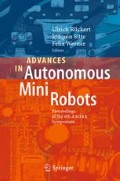Abstract
Recently, as the number of elderly people rises, much more caregivers are required for the support to them in the aging society. In general, the mental and physical care is very important in order to avoid the progress of dementia of elderly people living alone in home, but such elderly people have little chances to talk with other people and to perform daily physical activity. It is really ideal that human caregivers should play the roles in mental and physical care, but the number of caregivers and therapists is not enough in the current situation of highly aging society. The introduction of human-friendly robots instead of people is one of possible solutions to realize the mental and physical care for elderly people. The capabilities on social communication are required for human-friendly robots such as robot pets, robot partners and robot-assisted therapy to realize natural communication with people. For example, the conversation capability of a robot can be applied for preventing dementia of elderly people. Robotic conversation can activate the brain of such elderly people and improve their concentration and memory abilities. It is difficult, however, for a robot to converse appropriately with a person even if various contents of the conversation are designed in advance. The daily new information such as daily news and whether forecast should be announced to elderly people everyday. Furthermore, in addition to verbal communication, the robot should understand non-verbal communication e.g. gestures. In general, human communication is restricted by their environmental states, and furthermore, a human assumes the other human perceives the shared environment according to the relevance theory. Accordingly, a human often utters with words as few as possible. To realize the social communication with a person, the robot should acquire the environmental information required for human interactions, while should understand the meanings of gestures. Therefore, we propose an information support system based on conversation to elderly people by integrating robot technology, network technology, information technology, and intelligence technology in this research.
The accessibility to information resources within an environment is essential for both people and robots. Therefore, the environment surrounding people and robots should have a structured platform for gathering, storing, transforming, and providing information. Such an environment is called informationally structured space. The structuralization of informationally structured space realizes the quick update and access of valuable and useful information for people. The information is transformed into the useful form and style suitable to the specific features of robot partners and people. Furthermore, if the robot can share the environmental information with people, the social communication with people might become very smooth and natural. In this talk, we explain (1) the robot partners used in this study, (2) infromationally strucutred space and sensor netwrok systems, and (3) intelligent technologies used for human-friendly interaction and communication, and (4) application examples of human-friendly robot partners. Finally, we discuss the futhre vision to realize human-friendly robot partners.
Access this chapter
Tax calculation will be finalised at checkout
Purchases are for personal use only
Author information
Authors and Affiliations
Corresponding author
Editor information
Editors and Affiliations
Rights and permissions
Copyright information
© 2012 Springer-Verlag GmbH Berlin Heidelberg
About this paper
Cite this paper
Kubota, N. (2012). Human-Friendly Robot Partners in Informationally Structured Space. In: Rückert, U., Joaquin, S., Felix, W. (eds) Advances in Autonomous Mini Robots. Springer, Berlin, Heidelberg. https://doi.org/10.1007/978-3-642-27482-4_4
Download citation
DOI: https://doi.org/10.1007/978-3-642-27482-4_4
Publisher Name: Springer, Berlin, Heidelberg
Print ISBN: 978-3-642-27481-7
Online ISBN: 978-3-642-27482-4
eBook Packages: EngineeringEngineering (R0)

